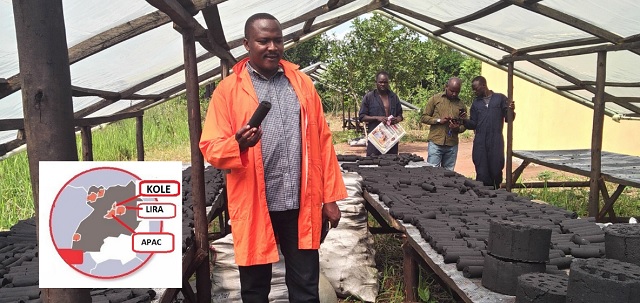
Water for People in partnership with Agency For Sustainable Rural Transfomation (AFSRT), ICCO Cooperation and Kole District Local Government on September 7, 2016 commissioned a faecal sludge treatment plant to improve sanitation and create business opportunities especially for youth in the district.
Kole district was specifically selected to benefit from this project because the district had no faecal sludge treatment plant at all, only relying on a few waste water stabilization ponds in neighboring Lira – a very busy business hub in Lango region.
Kole’s Decentralised Faecal Sludge Treatment (DEFAST) Plant was installed based on the principles of Sanitation As a Business (SAAB).
With a capacity of 10m3 of faecal sludge per day, the Kole plant worth $20,000 will help process sludge to produce an alternative source of energy for the communities and industries in Lira town and Kole district. The DEFAST plant seeks to attract private sector actors to invest in low cost faecal sludge management systems like gulping of pits as well as transportation, treatment and reuse of faecal sludge to make briquettes, manure and animal feeds.
According to officials of the international non-profit organisation Water For People, improved sanitation remains a key challenge with over two billion of the world’s population relying on On-Site Sanitation (OSS).
In Uganda over 90% of the population uses OSS and most towns are completely non-sewered. Unfortunately most OSS facilities are substandard – many are not lined while others are dug very deep without giving due consideration to the water table. According to officials, the main reason for the use of such substandard OSS facilities is lack of access to affordable and reliable emptying and treatment facilities.
Benefits Kole plant will bring
Kole’s Decentralised Feacal Sludge Treatment plant will support entrepreneur groups like recently formed Sani-Waste Solutions that provide affordable pit emptying services in addition to recruiting entrepreneurs into briquette production, marketing and sale.
Sani-Waste has been formed to do all the business in emptying, treatment, briquette production and selling. AFSRT will keep supporting them with business development and strategic positioning.
Kole’s plant will create a sanitation technology learning and skills transfer centre to enable youth to serve the entire region on a business approach.
Apart from the establishment of the treatment plant, Water For People has already trained and provided equipment to gulping entrepreneurs, introduced a transporting system and constructed a briquette-making facility.
Pit emptying using gulper has started in Kole and Lira districts. Briquette production has also started and there is ongoing creation of awareness and marketing through local radios. Over 10 youth, both male and female, are actively working around DEFAST plant for their daily income.
The entrepreneurs have formed groups and it is estimated that after a year of operation they should be able to generate enough income to buy more equipment, hence create more business and employment opportunities for more residents.
The Kole District DEFAST Plant is regarded as a model project and will form a basis for scaling up in other regions in the country.
Water for People plans to roll out treatment plants in towns with feacal sludge management gaps, especially those identified by the Ministry of Water and Environment in 2013.
 The Independent Uganda: You get the Truth we Pay the Price
The Independent Uganda: You get the Truth we Pay the Price





